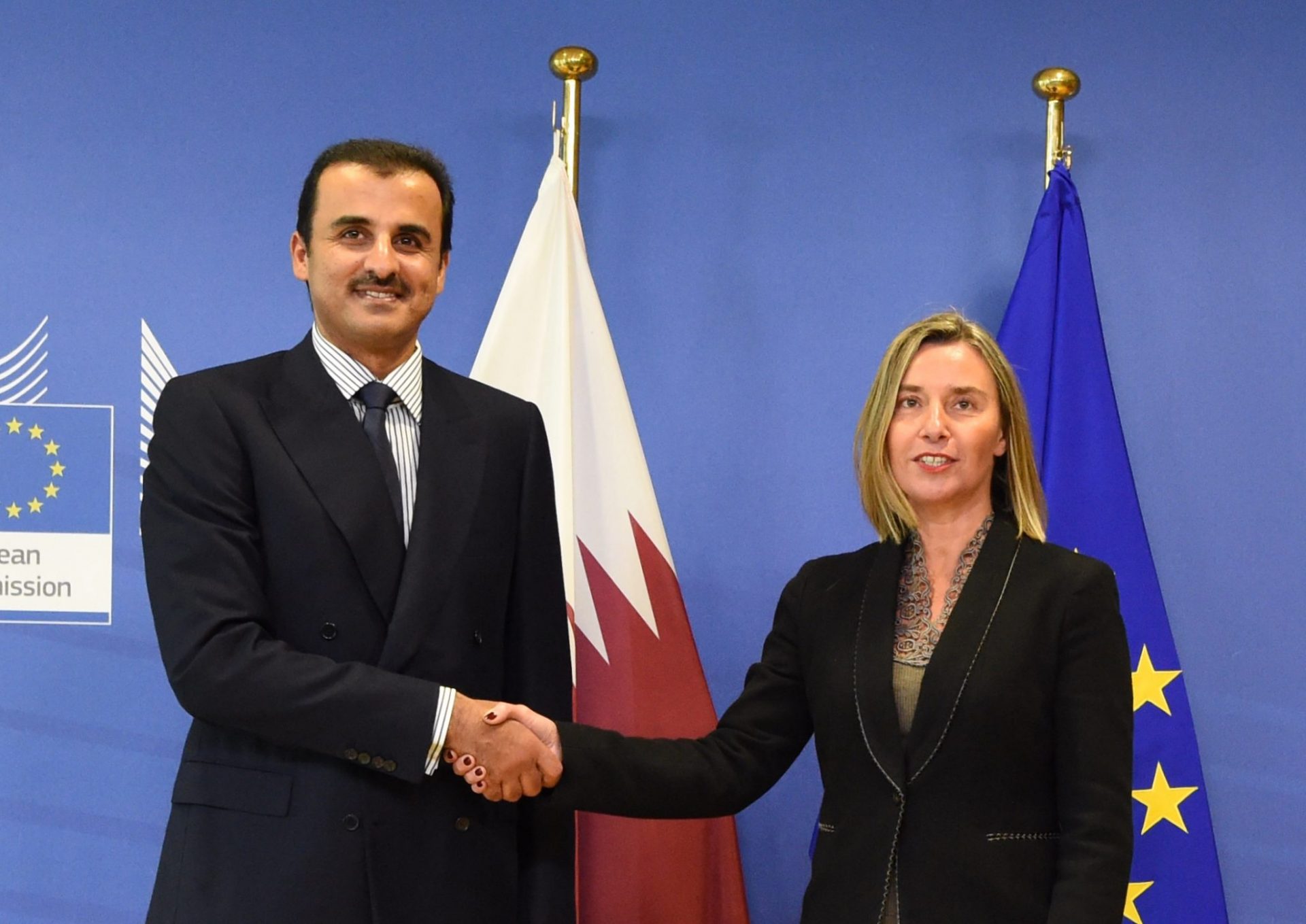
[authorbox authorid=”85″ title=”The Author”]
This is not the first time that a crisis started between Qatar and the other Gulf countries (the last one dates back to 2014). Tensions had risen when the state news agency of Qatar reported a quote from Emir Sheikh Tamim bin Hamad Al Thani: “There is no wisdom in nurturing hostility towards Iran”. Sentence immediately challenged by the other Gulf countries.
On June 5 last year, Egypt, Saudi Arabia, United Arab Emirates, Bahrain and Yemen suspended diplomatic relations with Qatar. Saudi Arabia accused Qatar of supporting terrorist groups “that undermine destabilizing the region, such as the Muslim Brotherhood, Isis and al Qaida”. Even the government of eastern Libya (the one not recognized by the UN, an ally of Egypt and the Emirates), Mauritius and the Maldives have decided to interrupt diplomatic relations with Qatar.
In addition to the interruption of diplomatic relations, drastic measures were taken to isolate the Quartan peninsula Saudi Arabia closed the land borders (the only ones connecting Qatar to the mainland) and the five countries announced the suspension of sea and air connections with Doha, with the closure within 24 hours of airspace and ports.
Qatar was also expelled from the Gulf countries’ military coalition in Yemen and led by Saudi Arabia. The diplomats of the five countries will leave Doha and the Qatari diplomats will have to leave their offices in the five countries in 48 hours. Qatari citizens residing in different Gulf countries and qatari tourists have 14 days to leave the Emirates and other countries.
Through the WAM national press agency the Government of the Emirates declared: “The Emirates affirm their commitment and their full support to the Gulf Cooperation Council and to the security and stability of the GCC States. In this context, on the basis of the State of Qatar’s insistence on continuing to undermine the security and stability of the region, and the failure to comply with international commitments and agreements, it was decided to take the necessary measures to safeguard the interests of the Member States. GCC “.
The announcements on the airlines are also clearer:
“The Emirates airline will suspend its flights starting at 2.30am tonight. Etihad will make the last flight to Doha at 2.45am tonight. Flydubai at 21.25 tonight. Air Arabia has already suspended all its flights to and from Qatar.”
Qatar Airways has therefore announced the suspension of flights to Saudi Arabia, United Arab Emirates, Egypt and Bahrain. The citizens of the Emirates are forbidden to go or simply pass through Qatar.
In the afternoon, the Foreign Minister of Qatar announced through Al Jazeera that these are “unjustified measures based on unfounded accusations” and “a violation of the sovereignty of Qatar”.
The following June 23, Egypt, Saudi Arabia, United Arab Emirates, Bahrain and Yemen present a document in 13 points, whose complete and unqualified fulfillment would be the premise at the end of the blockade.
Most of the requests appear in many ways pretentious, in a region where no one can seriously say outside of ties, connections, closeness – even ideological or historical – to some group linked in any way or form to terrorism. If nothing else for geopolitical opportunities.
—
Men less than the countries most involved in this block: Egypt, Saudi Arabia, Yemen, Emirates … which certainly did not shine in terms of financial transparency.
A year later, the situation is almost stuck in a stall that does not benefit any of the countries, which seems to continue a war at distance played on the international chessboard.
For example, we remind that in the Emirates the Expo will be held in 2020 – by many analysts the last chance to revive an economy that has never recovered from the crisis of 2008 and the failure of the sovereign real estate fund of Dubai.
Recall also in 2022 are expected the very rich football world Cup in Doha, Qatar, with stadiums of 150 thousand people all air-conditioned, which is expected that at the end of the event are dismantled and reassembled in five “poor” countries, as a donation for the promotion of sport.
Qatar, in order to survive the blockade, has established important commercial ties with China, Turkey, India and consolidated those with Iran and Kuwait. It has in fact become “the reference shareholder” of Oman – of which it has taken over the airline, restructured a port and created a second port from scratch.
The huge investment plan in England, from the real estate in London – where the royal family bought the property of the American embassy in the United Kingdom, which he then evicted to make an extra-luxury hotel, or where Al -Thani has acquired land, property and activities of Harrods from Al-Faied – up to Scotland.
Here, after taking over the historic Ritz-Carlton, to meet the national need for milk, the qatarini have inaugurated a cargo air bridge to transport scottish black-angus directly to special farms in the desert to produce “local Scottish milk” and of course the famous steaks.
Those who seem to benefit the most from this block are the British once again.
In fact, HSBC is the only foreign bank present simultaneously in Qatar and the Emirates, and British Airways is the only company that connects London directly with the two countries. And at least at the moment it is also the country that most benefits and attracts investments from all the countries involved.
In 2012, QIA bought a 20 percent stake in London’s Heathrow airport, while in 2016 Qatar Airways increased its stake in the company that owns British Airways, IAG SA, to 20 percent.
The first “playing field” are the European football teams.
Suffice it to say that the day after the establishment of the blockade the royal family of Qatar – indirectly the owner of the Paris Saint-Germain – bought Neymar for the record amount of 200 million euros.
It is not secondary that the main technical sponsor of the francse team owned by qatarina is “Fly Emirates”.
Fundamental global investments in geopolitics are mainly operated through QIA (Qatar Investment Authorities Holding), which is among the shareholders of Qatar National Bank (55% and 20 billion dollars in asset) Volkswagen (11%) Rsneft Oil (10%) Glencore ( 9%) Barclay Bank (7%) Royal Dutch Shell (2%) Agricultural Bank of China (13%) Sainsbury (22%) Tiffany (13%).
In 2012 Mayhoola for Investments, a company of Qatari investors, bought the Italian fashion house Valentino Fashion Group from the private equity firm Permira Adviser for about 700 million euros, while in 2015 the former Prime Minister of Qatar Hamad bin Jassim bought a 10 percent stake in the Spanish company El Corte Inglés, the largest department store chain in Western Europe.
Also in 2016 Qatar is one of the largest foreign net investors in the US.
The issuer qatariota BeIN Media Group acquired Miramax, the QIA was the fourth largest investor in office space in the United States, especially in New York and Los Angeles; in 2016 it acquired almost 10 percent of the company that owns the Empire State Building, the Empire State Realty Trust, and reached a collaboration agreement with the real estate company Brookfield Property Partners for an 8.1 billion euro project to margins of the West Side of New York.
Another European territory in which this game is played is “the Italian skies”.
While Ethiad – the airline of Abudabi – is a shareholder of Alitalia, and is seeing its investment reduced to the lowest terms of financial and industrial value given the conditions of the Italian national carrier, its main rival is AirItaly, “resuscitated” brand to acquire the activities of Meridiana – former company of the Aga Chan family – and of which the largest shareholder and investor (apparently with an investment of about 50 new aircraft) is precisely Qatar Airlines.
One of the best operations signed by Ambassador Salzano, recently appointed in Qatar and coming from Eni, which has led Italy to be a primary business partner, with contracts signed Fincantieri (coastal patrolling ships), Leonardo (plants for safety during the world championships) and Ansaldo (Doha Metro). Just to mention the majors.
China is the last to benefit from this crisis, in particular through a law of Qatar which, in order to develop industry and domestic production (and construction for its labor), envisages “giving away” land use, water and energy for those who decide to locate establishments in the peninsula.
Particularly interested were the Chinese, especially aluminum sulfates and phosphates, which are produced at practically tattered prices with these benefits. The well-informed speak of a crisis that is anything but geopolitical, linked rather to personal jealousies and competition between countries and emirs.
The scenario is of a Saudi Arabia waiting for concrete signs of rejuvenation after a long-term closure (for example, there is no tourist visa, but only “by invitation” for work reasons) with infrastructure of fifty years old, a country that has always had the United States as its sole partner and at the same time crushed by the highest expression of religious and cultural radicalism.
Egypt that struggles to find the road to democracy, and in the meantime wants to recover an international geopolitical weight, or at least in the region. Yemen, tired of isolation, looking for partners in the area that can finance their reconstruction.
The United Arab Emirates, which see the weakening of Qatar as the “short way” to dominate tourism and real estate, financial and tourism investment – and possibly also a commercial and strategic airport hub; if not to grow at least to exit definitively from the 2008 crisis.
While the GCC countries, to make their budgets a little more independent from oil – and also to exercise at least a control that gives rise to knowledge of the business volumes of the companies present in their respective countries – a year ago introduced ‘VAT (although at 5%, this however implies that they will have to begin to be drafted and deposited the budgets!), also on this point continues the battle between the countries: the only one who has “said no” to this dictat “made -in-arabia-saudi “was, once again, Qatar.
This – in short – the scenario, and how, so far, their protagonists are moving.
Without forgetting that both for “quantity produced” of oil, gas, aluminum, sulfates, and above all for coastal control of the transit routes of these raw materials, this “little quarrel” between apparently small countries that someone does not even know where they are, how much large, they are in reality, and as they are politically placed, it has a significant impact on European economies.




